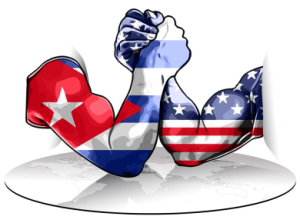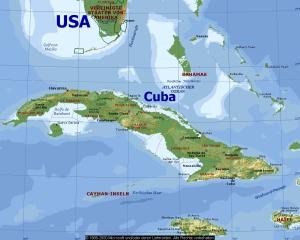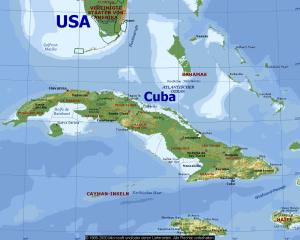CUBA AND UNITED STATES RELATIONS, ITS OPPOSING INTERESTS.
From the announcement of resumption of diplomatic relations between Cuba and the United States Obama has made no secret of its intention to achieve through ‘new diplomacy’ substantive changes related to their interests than half a century has not been the economic, commercial and financial blockade against the Cuban Revolution, and one of the ways it considers most appropriate for this is to contribute to the development and modernization of telecommunications, particularly the Internet, to penetrate ideologically.
No wonder that in the dialogue with Havana the White House and the State Department will grant special attention to this sector, believing that the current time is ripe for concrete actions that allow them to technological and economic dominance in the virtually untouched area in Cuba, but with the difficulty that the authorities are hypersensitive to anything that might mean danger of any kind to national security.
The most interesting is that Cuba has accepted the challenge launched by Obama, and very opposed to the White House grounds has already begun to move towards modernity in this area, but with very limited own resources insufficient for them to catch.
Executives from Google and other similar companies have held marathon meetings in Havana trying to high details and giving suggestions of what can or should do in the short term advantage that the precariousness of communications in Cuba and the island conditions , warrant the application of the latest technologies and large-scale investments.
Incredibly, for Cuba has been a great achievement by the end of 2015 will increase to more than 150,000 the number of Cubans with daily access to internet by opening public areas wifi, when the country has a total population of nearly 12 million people.
This makes it one of the nations globally with worst rate of connectivity, because this access only 5% of the population, although lower is still the percentage privileges of broadband, the brush barely one hundred.
This situation explains, on the other hand, the interest of the Cuban government to develop at full capacity this sector, because without a system of modern, efficient and quick communication, it is almost impossible to achieve the goals of economic, productive, commercial and financial growth, that the country program already underway.
It is within this context that a delegation led by US Ambassador Daniel Sepulveda, Deputy Assistant Secretary of State and Coordinator for International Communications and Policy Information, last week made another visit to Cuba, the second from the announcement diplomatic thaw.
The very composition of the delegation of Sepulveda says itself the importance that the White House gives the matter, as the delegation also led Thomas Wheeler, president of the Federal Communications Commission officials who accompanied the departments of State, Commerce and Treasury, and the FCC, as well as a large representation of companies.
Cuba reciprocated by the high level of representativeness which responded positively in some way to the expectations and confirmed its interest in taking this to the United States on the prospects for development of telecommunications that the nation is not tied to a single bidder.
Of course the effects of the blockade is also addressed in the field of telecommunications, such as the difficulties that Cuba for access to sites of US Internet that are key to its scientific-technical and economic development, as well as the scope and the limitations of the new regulations adopted by Washington for the sector.
The Cubans are kept at the expectation of what will happen from now on, but in the meantime no choice but to settle for the opening of wifi, at least, have given life and movement have left those places parks and squares where hundreds come daily hand cell in people.
Review / La Estrella de Panama / Luis Manuel Arce / Extracts / Internet Photos.
The Cuban History, Hollywood.
Arnoldo Varona, Editor.
LAS RELACIONES DE CUBA Y ESTADOS UNIDOS, SUS INTERESES OPUESTOS.
Desde el mismo anuncio de restablecimiento de relaciones diplomáticas entre Cuba y Estados Unidos Obama no ha ocultado su propósito de lograr mediante ‘una nueva diplomacia’ cambios sustantivos afines a sus intereses que en medio siglo no lo ha podido el bloqueo económico, comercial y financiero contra la Revolución cubana, y una de las vías que considera más adecuada para ello es la de contribuir al desarrollo y modernización de las telecomunicaciones, en especial la Internet, para penetrarla ideológicamente.
No extraña que en los diálogos con La Habana la Casa Blanca y el Departamento de Estado le otorguen a ese sector particular atención, pues consideran que el momento actual es propicio para acciones concretas que les permitan un dominio tecnológico y económico en ese ámbito virtualmente virgen en Cuba, pero con la dificultad de que sus autoridades son hipersensibles a todo lo que pueda significar peligros de cualquier naturaleza para la seguridad nacional.
Lo más interesante es que Cuba ha aceptado el reto lanzado por Obama, y por razones muy opuestas a las de la Casa Blanca ya ha comenzado a avanzar hacia la modernidad en ese ámbito, pero con recursos propios muy limitados insuficientes para salir de su atraso.
Ejecutivos de Google y de otras empresas semejantes han sostenido maratónicas reuniones en La Habana a altos niveles tratando detalles y dando sugerencias de lo que se puede o deba hacer en el corto plazo aprovechando que la precariedad de las comunicaciones en Cuba y las condiciones de la Isla, ameritan la aplicación de las más modernas tecnologías e inversiones a gran escala.
Aunque parezca increíble, para Cuba ha sido un gran logro que a finales de 2015 aumentará a más de 150 mil la cifra de cubanos con acceso diario a internet por la apertura de áreas públicas de wifi, cuando el país tiene una población total de casi 12 millones de personas.
Esto hace que sea una de las naciones a nivel global con peor tasa de conectividad, pues a esta solamente accede el 5 % de la población, aunque más bajo aún es el porcentaje que se privilegia de la banda ancha, al rozar apenas el uno por ciento.
Tal situación explica, por otra parte, el interés del Gobierno cubano en desarrollar a toda su capacidad ese sector, pues sin un sistema de comunicación moderno, eficiente y rápido, es casi imposible concretar los objetivos de crecimiento económico, productivo, comercial y financiero, que programa el país y que ya están en marcha.
Es dentro de este contexto que una delegación de Estados Unidos presidida por el embajador Daniel Sepúlveda, subsecretario adjunto del Departamento de Estado y coordinador para la Política Internacional de las Comunicaciones y la Información, realizó la semana pasada otra visita a Cuba, la segunda desde el anuncio del deshielo diplomático.
La propia composición de la comitiva de Sepúlveda dice por sí misma la importancia que la Casa Blanca le concede al asunto, pues la delegación la encabezó también Thomas Wheeler, presidente de la Comisión Federal de Comunicaciones a quienes los acompañaron funcionarios de los departamentos de Estado, Comercio y Tesoro, y de la FCC, así como una nutrida representación de empresas del sector.
Cuba reciprocó ese alto nivel de representatividad con lo cual respondió positivamente de alguna manera a las expectativas creadas y confirmó su interés en tener presente a Estados Unidos en las perspectivas de desarrollo de las telecomunicaciones que la nación no ata a un solo oferente.
Por supuesto que también se abordaron los efectos del bloqueo en la esfera de las telecomunicaciones, como por ejemplo las dificultades que tiene Cuba para el acceso a sitios de Internet estadounidenses que son claves para su desarrollo científico-técnico y económico, así como el alcance y las limitaciones de las nuevas regulaciones adoptadas por Washington para el sector.
Los cubanos de a pie se mantienen a la expectativa de lo que pueda ocurrir de ahora en adelante, pero mientras tanto no les queda más remedio que conformarse con la apertura de los lugares wifi que, al menos, le han dado vida y movimiento a esos parques y plazoletas donde acuden a diario cientos de personas celular en mano.
Opinion/La Estrella de Panamá/Luis Manuel Arce/Extractos/Internet Photos.
The Cuban History, HOLLYWOOD.
Arnoldo Varona, Editor.



 CUBA AND UNITED STATES Relations, its opposing interests. + LAS RELACIONES DE CUBA Y ESTADOS UNIDOS, SUS INTERESES OPUESTOS.
CUBA AND UNITED STATES Relations, its opposing interests. + LAS RELACIONES DE CUBA Y ESTADOS UNIDOS, SUS INTERESES OPUESTOS.



